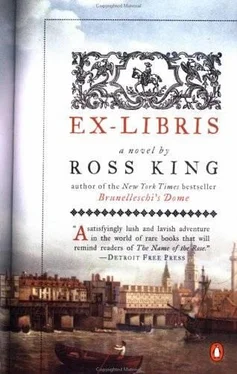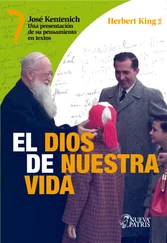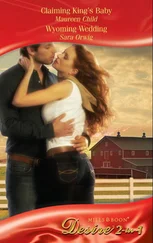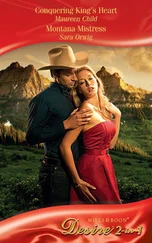I was confused for a second. Which turn to take? I thought I could hear the creak of a banister and Phineas's footfalls rising up as if from the bottom of a well. I considered calling out to him, but something in his manner-his banked-down insolence, his carnivorous smile-warned against it. Phineas was not my friend. So I kept to a straight line, following the corridor, club foot noisily clumping. Should I turn back, I wondered, and try one of the other doors? But I kept walking. A short distance beyond the intersection the corridor terminated at a locked door.
I turned round and retraced my steps. By now Phineas's footfalls had disappeared and all was silent but for my own hesitant steps and the occasional squeal of a naked floorboard. I realised with dismay that the doors and passageways must repeat the maze on the ground floor. The symmetry operated on a vertical as well as a horizontal axis.
I stood for a moment at the intersection before choosing the new corridor. I turned left into it and, after a dozen paces, left again. I remembered having read somewhere that one conquered labyrinths by turning always to the left. This policy seemed to be rewarded, for after a few more steps the corridor widened perceptibly and I found myself in a long gallery. On the walls I could make out dark rectangles, like shadows-the after-images of framed portraits that I supposed had been smashed or stolen by the Puritans. But there was no sign of the staircase.
I continued along the gallery, tapping my thorn-stick like a blind beggar. Soon the passage narrowed and the doors and niches disappeared. This corridor now seemed as perplexing and treacherous as the other. Should I backtrack, I wondered, and return to the Velvet Bedchamber? But could I find even that now? I was completely disoriented. But then the corridor took another left turn and at last, twenty paces ahead, came to an abrupt halt before two doors, one on either side. Both stood invitingly ajar, their brass knobs winking conspiratorially in the gloom. I paused for only a second before nudging open the one on the right and stepping inside.
I was struck immediately by the pungent smell. The acrid air tickled my nose like the stink in an apothecary's, the worst-smelling shop in London. And as my eyes adapted to the gloom I saw to my surprise that the room actually looked like that of an apothecary: every inch of its work-table and shelves was laden with alembics, blowpipes, funnels, burners, several pestles and mortars, as well as dozens of bottles and flasks filled with chemicals and powders of every colour. I had stumbled upon some sort of laboratory. Except these were not the potions of an apothecary, it appeared, but those of an alchemist. Remembering a few of the books on the library's shelves-the twaddle by charlatans such as Roger Bacon and George Ripley-I decided that Alethea must dabble in alchemy, that eccentric art supposedly invented by Hermes Trismegistus, the Egyptian priest and magician whose works, translated by Ficino, were also to be found on her shelves.
I felt a slight tweak of regret as I crept forward to the table. Was Lady Marchamont one of those seekers after the so-called elixir vitae , the miraculous potion that was supposed to grant eternal life? Or perhaps she hoped to discover the elusive philosopher's stone that would turn lumps of coal or clay into nuggets of gold. I had a sudden image of her bent over bubbling flasks and alembics, muttering spells in dog Latin as the bat-wings of her black cape drooped about her shoulders. Little wonder that the good people of Crampton Magna thought her a witch.
It must have been another few seconds before I saw the telescope on the window-sill. A handsome instrument, two feet in length, with vellum casing and brass ferrules, it was perched on a wooden tripod at a 45-degree angle to the floor, like a long finger pointed at the heavens. I leaned forward and tried to squint through the convex eye-lens, wondering if Alethea was an astrologer as well as an alchemist. I thought once again of the volumes of superstitious nonsense, along with the half-dozen star-atlases I had also spotted on the shelves. Or had the telescope and chemicals belonged to her father and was he the necromancer and stargazer? Perhaps Alethea was restoring his laboratory, like all else, to its original condition, one more side-chapel in the great shrine to Sir Ambrose Plessington.
But the room was not merely a shrine. The telescope was new-I could still smell its vellum-and someone had recently mixed the chemicals, for there was a powdery residue in one of the mortars and spillage on the table. A number of the vials, including one marked 'potassium cyanide', were half-empty.
Cyanide? I set the vial, filled with crystals, back on its shelf, feeling as though I had blundered across some forbidden secret. Was Alethea concocting some deadly sort of poison to deal with her mysterious adversaries? The thought was not so outlandish as it sounds. After all, in those days our newssheets teemed with alarming reports of how beautiful Parisiennes kept their poison bottles on their dressing-tables next to their perfume and powder. And in Rome priests were reporting to the Pope that young ladies had described in the confessional how they murdered their wealthy husbands with arsenic and cantharides bought from an ancient fortune-teller named Hieronyma Spara. So did Lord Marchamont meet his end in this hideous fashion-by poison? By his own wife's hand? Or was Alethea involved in some other activity, something slightly more innocent? Because from what little I understood of alchemy I knew that cyanide, a poison found in laurel leaves and the stones of cherries and peaches, was used in the extraction of gold and silver.
A wave of gooseflesh rose on my forearms. The chamber seemed chilly all of a sudden. From somewhere beyond the open window came the whinny of a horse and, below it, a clicking sound, sharp and silvery, like the clash of falchions. I turned round slowly, telling myself that my task, whatever it was, had nothing to do with this dreadful little room. The library and not the laboratory was my domain. But then I noticed something else amid the clutter.
The two volumes were almost hidden among the dozens of flasks and instruments. I reached for the one on top, expecting to see yet another alchemical treatise. But the volume turned out to be an atlas of the world, the Theatrum orbis terrarum by Abraham Ortelius. This edition had been printed in Prague in the year 1600, a few years after Ortelius's death, if I recalled. The pages were badly water-damaged but had been expertly rebound in buckram. Franked on the pastedown was an elaborate ex-libris with the motto Littera Scripta Manet .
For a moment I flipped through the tackled pages, through dozens of beautifully engraved maps. I was familiar enough with the atlas, though this particular edition was unknown to me. This was not so unusual, however, because the work had gone through dozens of editions since its first publication in 1570. I wondered how it had migrated from the library. Perhaps the great Ortelius, once the Royal Cosmographer to Philip II of Spain, had been reduced to a doorstop or a step-stool?
I set the atlas back on the table and picked up the second volume, which was newer and in considerably better condition. It was, I found, an equally distinguished work. Thomas Salusbury's translation of Galileo's Dialogo sopra i due massimi sistemi del mondo . Entitled The Systeme of the World: in Four Dialogues , it had been printed in London only a month or two earlier. I had ordered two dozen copies from the printer, all of which were sold in a matter of hours. Now I had scores of other orders from all over the country-and from Holland, France and Germany as well. The whole of Europe, it seemed, was clamouring to read this philosophical masterpiece, which was by far the most important and controversial book of its time, one the Jesuit priests in the Collegio Romano claimed would do more harm to Rome than Luther and Calvin combined.
Читать дальше












